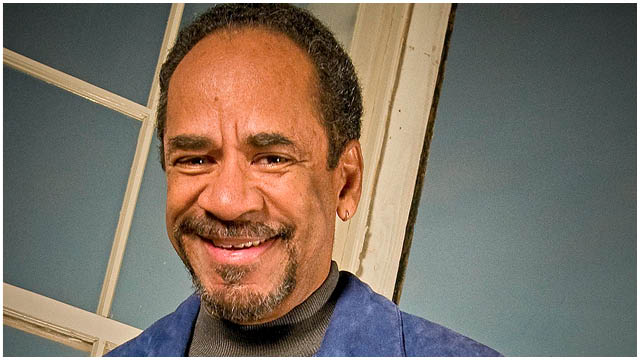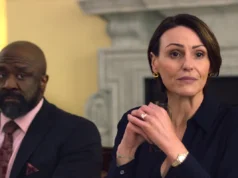Multi-award winning and acclaimed Actor, Director and Producer, Tim Reid, partnered up with the British Film Institute through his initiative, the Legacy Media Institute, to bring young filmmakers together for a 2-week intensive filmmaker’s workshop which culminated in a short film that was presented to an audience on its closing day.
“My name is Yasmin Godo. I participated in the Legacy Media Institute, 2-week film course. I was given the role of Assistant Director (1st AD). I came on board to sharpen my screenwriting skills; however I came away with much more, a rounded view and understanding of the film industry.
With a firmer understanding of the type of content, I want to produce and be able to give people access to. I now have a broader network as well as firsthand experience & knowledge”
Reid, best known for his roles in the television series Frank’s Place, Sister Sister, and more hosted the last day “The Birth and Legacy of Race Movies in the US” and we got a chance to sit down with him for a little chat that turned out to be quite long and we still didn’t get a chance to finish as he was called away.
Your working with the Legacy Media Institute, Tell us about the project and what you guys do there?
Basically what we do is work with emerging filmmakers, We give.. The best way to describe it is reality training. You know we don’t teach people how to use a camera, We inform people on the ways of how to make something useful, We focus on giving them a sense of business in the creative side of television and also the responsibility side of the images you put out. It’s basically a propaganda machine (Laughs).
How did you first get involved?
Well, I meet a lot of young filmmakers, well not filmmakers at that point but young kids who are in communication programs in colleges in America who would come to my studio to try to get work. I ask them what it is they are proficient in and they would say I’m a producer, Director and I ask them if they have ever done it before. They say no I’ve just got out of school. Well like why would I hire you? You have no skills. I could put you in as an intern perhaps maybe, they ask how am I going to eat, I don’t know at this point it’s not my problem, but if you want to hang out and get a sense of what we do you’re welcome to hang around and I’ll put you to work. I thought, they just thought they could come out of school, and get an entry level job and get right to work making television shows. It’s shown to be so easy but the media, YouTube and all these other little fly-by-nights which have grown into big major corporations. They start out by using the content of other people they make money by look who’s on my channel looking at this, but the filmmaker doesn’t make any money, very rarely. So I mean they may build a career perhaps, a few do, but by and large most people just throw stuff up there and it’s become a very… I don’t know, psychologists are gonna be looking at these trends of selfies and putting stuff out there for likes for a long long time, It’s creating a very narcissistic creative community. They don’t really create from other people, they are creating stuff about themselves. So I’m looking at that thinking that ain’t gonna last long, that’s not going to go far, cultural improvements. So I wanted to create something that would give me an opportunity to interact with the new emerging filmmakers and see if I could be inspired by them or the other side, inspire them to focus on cultural content that would be more useful to viewers in an entertaining way.
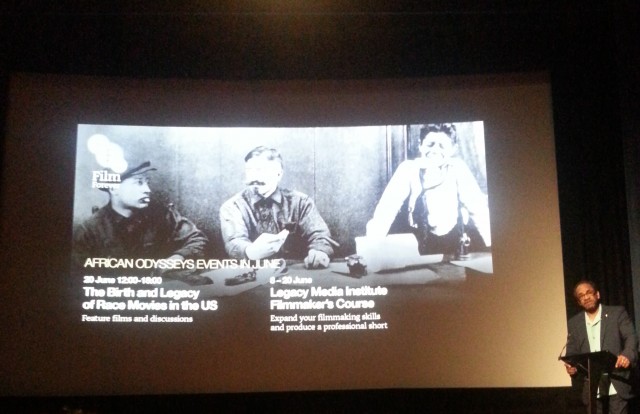
This is your third year of coming over here for this, is it better received over here working with young filmmakers than it is in the states?
It’s not that large of an organisation to build those kinds of comparisons, but I will make a comparison that I think the writers that I have come into contact with here in England are better writers than the writers in America. Not so much from the content itself but by the approach and the kind of stories they are seeking tell, Especially Black American up and coming filmmakers. They are always focusing on how the environment, the culture, the police or the community affects them and it’s kind of the victimization story at certain levels. Whereas writers here are writing about how they affect their environment, I find that as a filmmaker, far more interesting. I’ve seen those stories, I mean what’s happening in Ferguson and what’s happening in Baltimore, what’s happening in Charleston, it’s happened so many times in the history of black America that it is not something that inspires me to write about, what inspires me to think is when will we come up with some solutions so this isn’t as repetitive as it’s become. How do we make it different, we need change? Depending on whose reading the bible determines what’s good or bad (laughs), or the Koran or whatever, you name it. There’s always someone who judges the value of it. I just look at how change is needed in order for our society to grow.
There still isn’t a lot of diversity in films, why do you think in this day and age we still lack that cultural diversity?
Well, we have forgotten the very premise of filmmaking that started in France before it came to America. The reason the filmmakers were making these films was because they were interested in this new industry and they wanted to tell their story and they took control of the tools they had. They taught themselves the technique and they made films about what interested them. We of African descent, in particular, are more drawn more towards having our stories told by someone else. So there’s not that drive on a large level enough to create an industry that can be self-sufficient, can go from idea to distribution, the only one that I know that is on the verge of creating that is Nigeria, of course it’s all underground and all bootlegged, nonetheless, they have managed to find a method to get the stories of their culture around the world, you can find Nigerian films in just about any community you find black people or in Nigeria, So you won’t find my films, and I’ve done nine. But it’s hard to find them in any stores, it’s hard to find them because at that time we were associating with the mainstream distribution and they aren’t concerned about our culture as we are about our culture. It’s not in their interest.
Do you also find, and I have noticed this lot, that in black culture you don’t support your own?
That’s not really true in the sense… I grew up in a community that spawned race movies. The problem is it’s a small little boutique system everywhere it goes. That’s why I keep going back to Nigeria; Nigeria has proven to itself and to the system that there is a massive audience for Nigerian films. As India has proven, No matter where they are in the world until we, in America, realise there is a massive audience for our content, our entertainment will we begin to do the things, they’re going to be expensive, they’re going to be difficult, they are going to take a lot of work but only the privileged society gets things easy. if you want to build something you have to put your money in your mouth and everything in the same direction and make it work. The same thing about Black Brits, they are going to have to not wait on funding or apparatus to finally open the door for them. They’ve got to build another room with its own door. They supply to an audience that’s hungry. People always get away with that lie, there’s not really an audience. Do you know it’s one of the major audiences in the world, people black or white want to find out about the black lifestyle? I go to Africa and I see the words “Thug Life” on t-shirts of people living in a little village in a hut. Thug Life in this hut gimme a break (laughs). So the culture itself is the most valuable cultural phenomena in the world today. The style, the look, it saved Nike. Michael Jordan is still selling underwear and shoes and he hasn’t played basketball in 20 years (laughs). So the style is Venus Williams, wears something that shows her body, massive and beautiful body, in a way that just makes news. Kim Kardashian takes on as much as the Black body lifestyle as she can and suddenly she is all over the news. We need distribution, we need to set it up, nobody ain’t gonna give it to me, we need to set it up. Stop complaining.
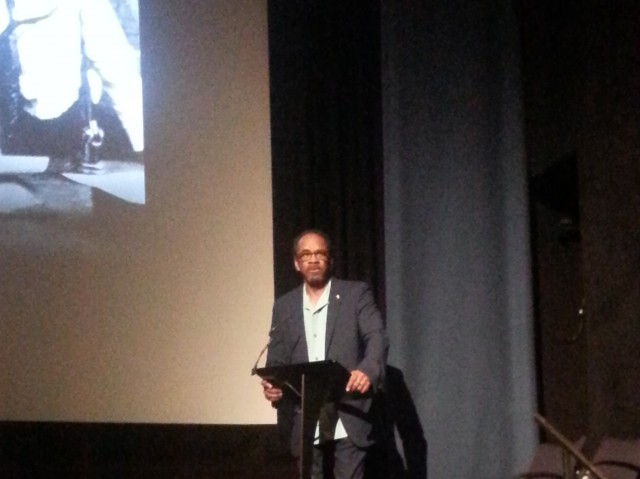
What would you class as the first important black film of all time or what motivated you to get into the business?
There are a lot of films; it’s hard to say of all time because I don’t think a white filmmaking society can name the greatest film of all time. Although, The Godfather has become the easy choice. I would say periods of the 50’s, 60’s period there was a wonderful film called Nothing But A Man, I thought culturally it was one of the more important films to be made in that era. I made a film in the 90’s that I still say culturally for me was one of the most important films that time called Once Upon A Time when we were Coloured. I think City of God in 2000 was a very important film. Well done, the story is powerful it deals with the reality of a certain life style in Cuba that most people don’t know anything about. There is Claudine from the 60’s, there are a lot of films, I love film, there are a lot of films that answer to a cultural need that has nothing to do with being victims. 12 Years a Slave and all of that, while they are important films, I don’t look at them in a way of putting them into a category to compete with some of the films I have mentioned. Only because it is a rehashing of a very bitter period, not that we certainly shouldn’t remember it but if we are going to enter a new world, we better start using the lessons learnt from the period of 12 Years A Slave and begin to construct an environment that will not allow Charleston to just happen. The reaction to it will be about humanity, the reaction will be in a way so powerful that it will begin to deter someone from thinking to do that again. Not out of being sentenced or hung, it’s just that the emotional aspect, the power that one has over one’s emotion. If we can turn a society to express more of their emotional natural human feelings in a way whether it talking about the relationship with men or women or children or whatever. I think it would have more of an effect.
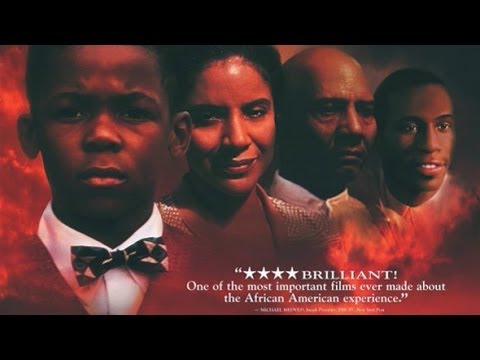
I was going to say, these films are an important history lesson but do you think they might be making the younger black generation angry now seeing that on screen.
I don’t think angrier; I think they ignore them more. Now in the context of where we are going then it’s a lesson, but it’s like all of a sudden the whole slavery syndrome has come back into vogue from the media point of view. Why? Why are we still trying to keep people mentally focused on being the victim? History of victimization of people, if you really want to tell a story of victimization for black people let’s talk about the story of King Leopold and the Congo. Where this devil in human clothing murdered over 18 million people and maimed another 5 or 6 million. Why aren’t there stories about that sort of thing, because people, who control the machine, control the movement of propaganda? Don’t want that kind of primitivism attributed to them. England will not do a whole lot of stories about the negative aspects of its control of India (laughs)… If they do they will be like you know we did our best. I showed a film here at the BFI about two years ago called The Mark of The Hawk, starred Sidney Poitier and Eartha Kitt and John McIntire and it was about the Mau Mau revolt, but it was told from the stand point of the English, saying if the lion had told the story of the hunt it would be a different outcome, but with the hunter telling the story he will always be the victor. He’s always either going to be abused by the lion or the reason to kill the lion is always going to be from his point of view. We’ve got to change that perspective; we’ve got to get behind how young people see themselves in a more open and totality as a human being. When you only see one side of a race, it’s like Germans, I used to spend some time in Germany, but I would always stay away from Berlin. I’d go to Stuttgart, I’d go to Frankfurt, I’d go to all these places, I would fly into Berlin but I would never leave the airport, I had this negative thing about Berlin and the holocaust and for some reason I would never go. I have a nephew who is an ex patriot, who passed away recently. He had been there for 12 years, spoke fluent German, sang in German and he kept trying to get me to come. So finally one time I said I’m going to Berlin, to hell with Hitler and I get there and I wondered why the hell did I wait so long, what a beautiful, beautiful city. If I was a young person today, I don’t care what my profession would be, if I was in my twenties or thirty’s today I would move to Berlin. It’s a young person’s city. You don’t see that in the media.
We loved talking to Tim and could have chatted all day. Thank you for taking the time to talk to us.

